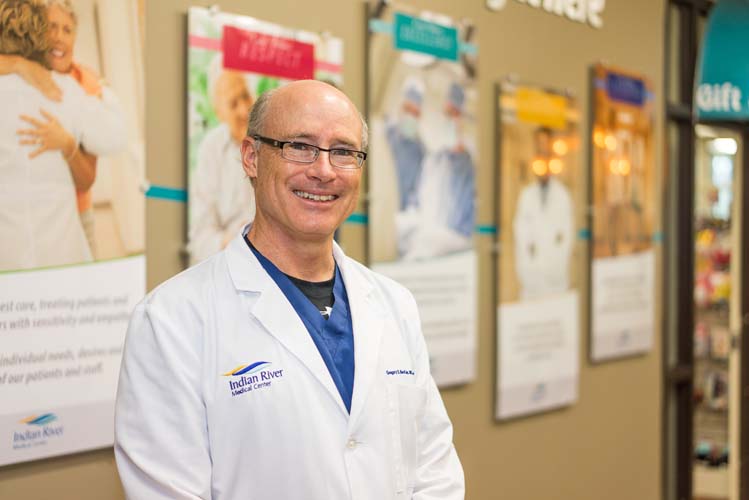
Having gastrointestinal issues? You are far from alone.
The National Institute of Diabetes and Digestive and Kidney Diseases reports that well over 70 million Americans are affected by various digestive health problems annually.
That’s roughly one in every five people in the country.
Those digestive – or gastrointestinal – problems lead to well over 6 million in-patient hospital procedures each year.
Combine those numbers with the American Cancer Society’s April 2017 prediction that colon cancer will claim some 50,000 lives this year, and the overall gastrointestinal picture might seem somewhat bleak.
In the eyes of Indian River Medical Center gastroenterologist Dr. Gregory MacKay, however, the local outlook is much brighter now that construction has begun on the new Scully Endoscopy Center at the Vero Beach hospital.
“We’re thrilled,” says a smiling MacKay. “I think it’s going to be excellent for patient care. We’re going to be able to take care of more patients with this center. And, it’s going to be, I think, easier for patients to access our center.”
Pausing only briefly, MacKay adds, “We’ll have areas for family to wait and we are getting new scopes and equipment to fully outfit” the new facility.
Endoscopy, in its simplest terms, is the use of Lilliputian-sized cameras attached to flexible tubing which allows physicians to view, in real time, areas or organs inside the body which may be infected, damaged or cancerous.
The U.S. National Library of Medicine calls endoscopy “the keystone of modern gastroenterology.”
At IRMC, endoscopy has grown exponentially both in terms of patients seen and procedures performed over the past five years, becoming an invaluable diagnostic and treatment tool.
Aside from its well-documented success in finding and removing colon cancers, endoscopy allows doctors to look for gastric, rectal, pancreatic, esophageal, liver and other cancers while also tackling a staggering array of gastroenterological issues including acid reflux, GERD, heartburn, dyspepsia, irritable bowel syndrome, hemorrhoids, anal fistulas, peptic ulcers, abdominal pain syndrome, biliary tract disorders, gallbladder issues and pancreatitis.
That’s a massive workload and an even longer checklist to go through before any accurate diagnosis can be made.
MacKay knows that better than most. In 2012, he was one of the current center’s founding fathers and since then the number of patients seen each year has nearly doubled.
“Five years ago when our group, Vero Gastroenterology, joined with the hospital to improve GI care within the community, we developed an outpatient endoscopy center. It was in an intensive care unit or ICU that was being vacated when the new surgical ICU opened. We had an area that we renovated on a fairly small budget but made it extremely functional and good for patient care. It worked very well for five years and delivered excellent care to the community. [But now] our number of patients has been expanding and the procedures we’re doing have expanded.”
Vero’s demographics account for a substantial part of the new patient load.
“GI conditions,” MacKay says, “are worse as we get older. That’s why this community has a tremendous amount of GI problems.”
Today, the center boasts five full time gastroenterology physicians including Dr. Ashley Canipe, Dr. Charles Eberhart, Dr. Bruce Grossman, Dr. Joseph Zerega and MacKay in what can now accurately be described as cramped quarters or – as MacKay diplomatically phrases it – “an extremely busy” workplace.
Here Richard Van Lith, an IRMC vice president, enters the conversation saying that the new facility will be “about 10,000 square feet.”
That’s roughly twice the size of the current center.
Approximately 4,500 square feet, according to Van Lith, will be on the ground floor with a covered, drive-up entrance, a reception area and an elevator that goes up to an additional 5,500 square feet on the second floor where the new endoscopy suites will be located.
Just the covered drive-up entrance, says Van Lith, will be a welcome change for both current and future patients. Currently those patients have to park over by the hospital’s Patient Pavilion and ER entrance and – as Van Lith puts it – “traipse all the way through the hospital to get here.”
That’s asking a great deal from patients with wheelchairs, walkers, hip or knee problems or a bad stomach ache.
Van Lith says the endoscopy center was designed with future growth in mind
“If the demand does grow, we’ve been smart enough to do this expansion in a spot where we can expand within the existing [building] footprint and not [have to] build more building.”
The new $6.1-million facility is scheduled to open in early 2018. For more information, call the IRMC endoscopy center at 772-299-3511.



